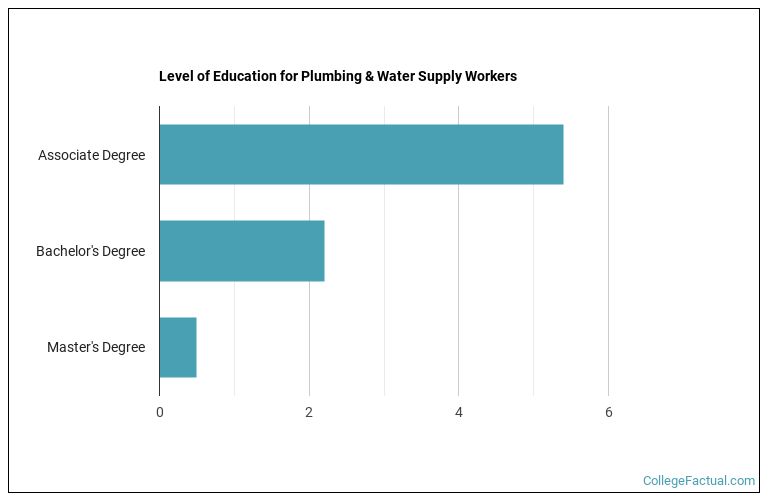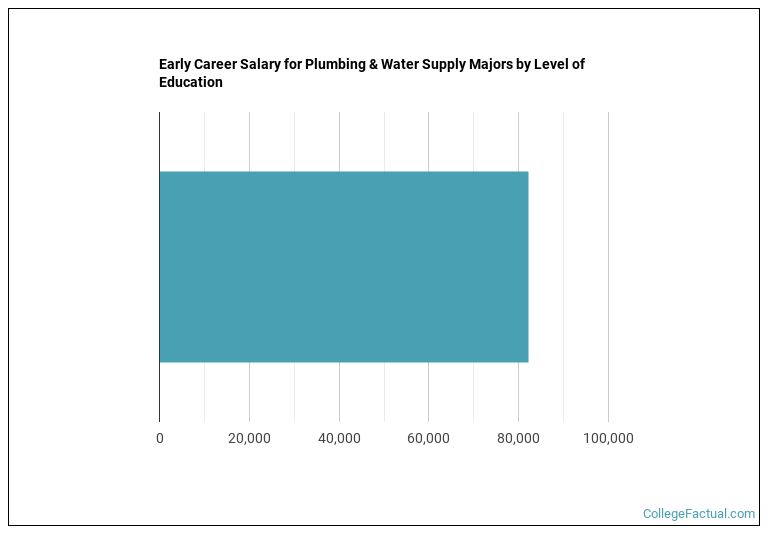 by our College Data Analytics Team
by our College Data Analytics TeamPlumbers are responsible for a lot more than just fixing your leaky sink. They design, install and renovate systems that carry liquids or gasses. Most people think of plumbers as only dealing with water in residential and commercial locations, but they also deal with industrial settings where they may need to build a system that carries gas from one location to another. Other related positions include well driller, water blaster, and pipefitter.
Plumbers and related water service positions cut and fit the piping necessary to carry these liquids and gases without leaks. To be a successful plumber, you have to have on the job training as part of an apprenticeship and depending on your goals; you may also want to attend a vocational school. Vocational schools will focus on the skills needed to be successful. You will attend courses in mathematics, system design, building codes, and safety. Technical courses will train you on the specifics of cutting and fitting pipes together through mechanical or chemical welding.
In 2021-2022, plumbing & water supply was the 310th most popular major nationwide with 2,888 degrees awarded. This year's Best Plumbing & Water Supply Schools ranking compares 5 of them to identify the best overall programs in the country. Explore this or one of our many other custom plumbing rankings further below.
Plumbers need to have a set of skills before they can go out and be successful. This includes physical ability, as dexterity and strength are important. Plumbers will need to be able to lift heavy equipment and materials while also being able to maneuver parts and pieces into precise locations.
They will also need to have good attention to detail, so any cuts and fittings are made correctly. Plumbers must also have good troubleshooting skills as not everything always goes as planned. They need to be able to come up with creative solutions to issues they may run into on the spot and troubleshoot issues they come across.
plumbing & water supply degree applicants generally need have finished high school or their GED. Many schools may also have GPA and SAT/ACT score minimums that must be met. Specific plumbing careers may require a certain level of degree attainment or additional certifications beyond that.
There are many different plumbing degree levels. Plumbing & Water Supply programs offered by schools range from a to a , which is the highest plumbing degree you can get. Plumbing & Water Supply programs can take anywhere between one to four or more years for a full-time student to complete.
| Degree | Credit Requirements | Typical Program Length |
|---|---|---|
| Associate Degree | 60-70 credits | 2 years |
| Bachelor’s Degree | 120 credits | 4 years |
| Master’s Degree | 50-70 credits | 1-3 years |
| Doctorate | Program required coursework including thesis or dissertation | At least 4 years |
An associate degree is the most common level of education achieved by those in careers related to plumbing, with approximately 3.2% of workers getting one. Find out other typical degree levels for plumbing workers below.
| Level of Education | Percentage of Workers |
|---|---|
| High School Diploma | 38.1% |
| Post-Secondary Certificate | 27.1% |
| Less than a High School Diploma | 19.7% |
| Some College Courses | 11.1% |
| Associate’s Degree (or other 2-year degree) | 2.7% |
See the chart below for the most common degree level workers in plumbing & water supply have received.

This of course varies depending on which plumbing career you choose.
Plumbers can work for large plumbing and HVAC companies or they can strike out on their own and work independently. If you want to run your own business, it will be important for you to take basic business courses so you can properly provide estimates to clients, track inventory and track your finances.
Want a job when you graduate with your plumbing degree? Plumbing & Water Supply careers are expected to grow 14.3% between 2016 and 2026.
The following options are some of the most in-demand careers related to plumbing & water supply.
| Occupation Name | Projected Jobs | Expected Growth |
|---|---|---|
| Construction Trades and Extraction Worker Supervisors | 678,300 | 12.6% |
| Plumbers, Pipefitters, and Steamfitters | 555,800 | 15.6% |
| Septic Tank Servicers and Sewer Pipe Cleaners | 33,400 | 17.2% |
| Earth Drillers | 23,500 | 19.9% |
| Rotary Drill Operators | 20,800 | 24.6% |
Recently graduated plumbing & water supply students earned an average of $34,421 in <nil>. Earnings can range from as low as $19,156 to as high as $82,191. As you might expect, salaries for plumbing graduates vary depending on the level of education that was acquired.

Salaries for plumbing & water supply graduates can vary widely by the occupation you choose as well. The following table shows the top highest paying careers plumbing grads often go into.
| Occupation Name | Median Average Salary |
|---|---|
| Construction Trades and Extraction Worker Supervisors | $70,540 |
| Plumbers, Pipefitters, and Steamfitters | $58,150 |
| Rotary Drill Operators | $56,740 |
| Explosives Workers, Ordnance Handling Experts, and Blasters | $52,780 |
| Oil and Gas Derrick Operators | $47,630 |
With over 306 different plumbing degree programs to choose from, finding the best fit for you can be a challenge. Fortunately you have come to the right place. We have analyzed all of these schools to come up with hundreds of unbiased plumbing school rankings to help you with this.
Plumbing & Water Supply is one of 6 different types of Construction Trades programs to choose from.
| Major | Annual Graduates |
|---|---|
| Plumbing Technology/Plumber | 2,209 |
| Pipefitting/Pipefitter & Sprinkler Fitter | 663 |
| Other Plumbing & Related Water Supply Services | 11 |
| Well Drilling/Driller | 5 |
| Related Major | Annual Graduates |
|---|---|
| Electrical & Power Transmission Installers | 26,459 |
| Building Management & Inspection | 5,269 |
| Carpentry | 3,899 |
| Construction | 1,813 |
| Masonry | 284 |